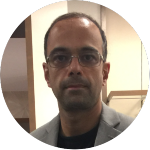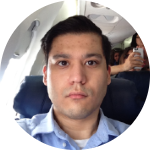How it started
A decade ago, the director of a nursing home approached us with a problem. His residents were regularly losing their dentures, and he was spending thousands of dollars on replacements and dealing with angry families. We started a project to develop a system that would eliminate denture loss in nursing homes, and after a couple of years of research, antenna design, and testing, Scandent was born.
Where we are
Since our launch, Scandent has been expanded to protect hearing aids, eyeglasses, wallets, cell phones, clothing, wheelchairs, and various electronic and medical devices. We have also developed wristbands for wander management so that nursing homes can ensure the safety of their Memory Care residents, protect residents’ personal items, and secure their own assets with one integrated system.
Where we’re going
Scandent is now deployed in over 40 nursing homes and healthcare facilities across the country, from New York to North Dakota, and from Arkansas to Idaho. We are continuously striving to improve our system and develop new and better tags for all types of items and devices found in nursing homes. As we did at the start, we aspire to help all nursing home residents live happier and healthier lives.
SCANDENT NEWS AND MEDIA

|
Pocatello Veterans Home Adopts Scandent to Protect Resident Property
Pocatello, Idaho - February 2, 2018 - The Pocatello Veterans Home installed Scandent this week to protect its residents' dentures, hearing aids, eyeglasses, cell phones, and wallets. It is the first nursing home in Idaho to use Scandent, and also plans to use the system to track music players and gaming devices. Pocatello is a 66-bed nursing facility built on land donated by Idaho State University. It has gorgeous hilltop views of the City of Pocatello and offers therapy and activity rooms, a chapel, a library, lounge areas, and a rose garden that residents can plant and tend. |

|
Fifth Maine Veterans' Home Deploys Scandent
South Paris, Maine - August 21, 2017 - Maine Veterans' Home South Paris installed a Scandent checkpoint this week to scan its laundry and garbage bins, becoming the fifth Maine Veterans' Home to use Scandent. South Paris is a 90-bed nursing home, with 62 beds for long term care, short term skilled nursing care, memory care, rehabilitation, and therapy, and 28 beds for assisted living residential care. The home has a country charm and small town feel, and is set on 11 acres with scenic wildlife and gorgeous mountain views. |

|
Second Michigan Veterans Home Gets Scandent
Grand Rapids, Mich. - June 30, 2017 - Grand Rapids became the second Michigan Veterans Home to use Scandent, deploying checkpoints in its laundry room, kitchen, and at two facility exits to safeguard resident belongings and facility property. The home was established in 1885 to serve the needs of veterans of the Civil War and is located on 90 wooded and landscaped acres off the banks of the Grand River. The home has 450 skilled nursing care beds and 100 domiciliary beds, and offers an in-house pharmacy, rehabilitation therapy, pastoral care, and specialty clinics. |
Pagination
MANAGEMENT TEAM

Vladimir Djuric
Chief Executive Officer
Vlad is the CEO and cofounder of Scandent. Prior to Scandent, Vlad was an Associate and a founding member of OpenView Venture Partners, a $1.5 billion venture capital fund that invests in software companies. While at OpenView, Vlad sourced and helped deploy $50 million into seven new investments and worked with portfolio companies to develop their finance functions. Before OpenView, Vlad was an Analyst at Insight Venture Partners. Vlad graduated from Harvard University with a B.A. in Economics. Vlad holds a patent in the RFID field.

Akshay Athalye
Chief Technology Officer
Akshay is the CTO and cofounder of Scandent. Prior to Scandent, Akshay was a Research Scientist at the Research Foundation at Stony Brook University, where his research interests focused on RFID hardware design, protocol development, and signal processing. Akshay holds several RFID-related patents and has been involved in RFID research for over a decade. Akshay has a PhD in Electrical Engineering from Stony Brook University, and has numerous RFID-related publications in academic and industry journals.

Richard Yao
Principal Systems Engineer
Richard is the Principal Systems Engineer at Scandent. He is a former Gentoo Linux developer with extensive experience in computer operating systems and storage. He was previously a major contributor to OpenZFS and has contributed to dozens of open source projects, including the Linux kernel. He enjoys work that improves humanity’s quality of life. He holds a B.S. in both Computer Science and Applied Mathematics and Statistics from the College of Engineering and Applied Sciences at Stony Brook University.